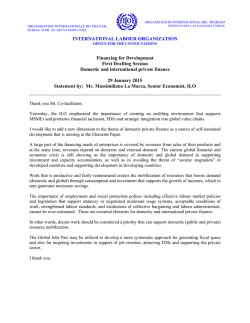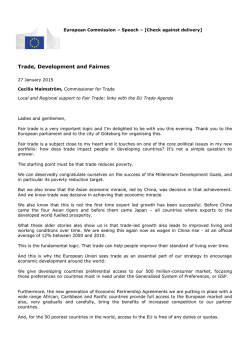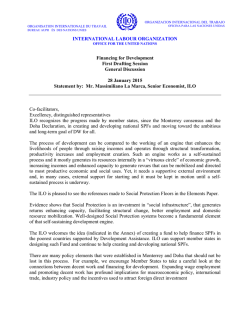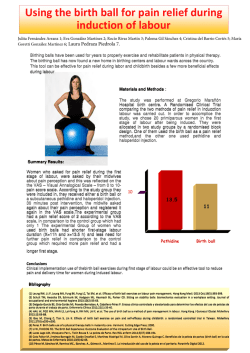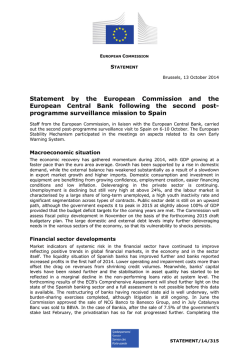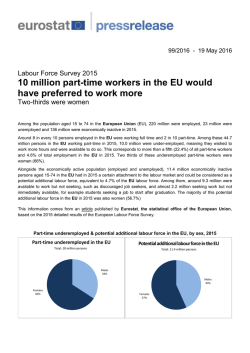
Invisible jobs - Il Sole 24 Ore
Briefing
December 2015
Invisible jobs
The situation of domestic workers
SUMMARY
Domestic workers are persons engaged in household services such as childcare, care of
the elderly or housekeeping – via a formal or informal employment relationship. They
can be nationals of the country or migrants, and can have varied working conditions,
involving living within or outside the household. More than 80% of the domestic
workers in the world are women.
Due to the 'invisible' and sometimes illegal nature of their job, domestic workers are
often confronted by problems such as low pay, irregular residence and employment
conditions, no social security or benefits, no access to childcare facilities for their own
children and limited time off work. Some subgroups, such as immigrants or live-in
workers, are particularly vulnerable to discrimination.
Despite initiatives in several European Union Member States, domestic workers are
not always offered protection by national labour laws, and opportunities for 'decent
work' can be limited.
The implementation by the Member States of Convention No 189 and Recommendation No 201 of the International Labour Organization (ILO) could provide
domestic workers with guarantees of decent work and similar working conditions to
those of workers in other economic sectors.
In this briefing:
What is domestic work?
Characteristics and problems of domestic
work
Number of domestic workers
National and European framework
Main references
EPRS | European Parliamentary Research Service
Author: Monika Kiss
Members' Research Service
PE 573.874
EN
EPRS
Invisible jobs
What is domestic work?
According to Eurostat's classification, domestic work involves providing care to children,
the elderly, or persons with disabilities. It also includes tasks such as cleaning and
cooking – traditionally unpaid household jobs allocated to women. Domestic work may
also include other tasks like gardening, chauffeuring or providing security services –
tasks more regularly performed by men. Changes in western European employment and
demography (increasing participation of women in the labour market, challenges of
balancing work and family life, and an agеing population) have pushed up the demand
for domestic work, turning it into a fast-growing sector of the economy.1 Some
domestic workers live and work full time on the premises of their employer ('live-in'
workers). Others live elsewhere and travel to their workplace(s) for a number of hours
per week ('live-out' workers). According to the ILO, domestic work is performed as part
of an employment relationship for one or more households.
Characteristics and problems of domestic work
In domestic work, the employment relationship is an 'atypical' one, where the worker is
'invisible' to the outside world and does not have a precise job specification (in terms of
working hours, free time or annual leave). This makes it easy for employers to infringe
national labour laws.
Where there is no formal employment contract, domestic work belongs to the informal
economy, which includes 'all economic activities that are – in law or practice – not
covered or insufficiently covered by formal arrangements'. According to the European
Federation for Services to Individuals, in 2010, the share of informal work in the market
for personal services was 70% in Italy and Spain; 50% in the United Kingdom; 45% in
Germany; 40% in the Netherlands; 30% in France and Belgium; and 15% in Sweden.
Potential problems linked to this kind of work include lack of adequate accommodation,
privacy or health insurance, as well as no protection against illness, occupational
accidents and workplace hazards. There is also a possible lack of access to social security
benefits, such as maternity protection and pension schemes. Sickness, injury and
pregnancy can thus be grounds for immediate dismissal. This deprives domestic workers
of the security offered through 'decent work'. In some cases, mainly involving migrant
workers, domestic work is associated with precarious work, defined by the inability of
individuals to impose their rights, the absence of social protection, as well as health and
safety risks and insufficient income. Furthermore, domestic work is characterised by an
unspecified length of employment and uncertainty about future employment. Domestic
workers' wages are often below the national statutory minimum wage, and there is no
provision for overtime pay. In addition, wage payments may be delayed, improperly
calculated or withheld arbitrarily.
Number of domestic workers
As the European Trade Union Confederation (ETUC) points out, obtaining reliable data
on domestic work in Europe is difficult, particularly due to its often 'informal' character.
According to the ILO's recent global and regional estimates, at least 52.6 million persons
above the age of 15 worldwide are domestic workers, of whom 43.6 million, or 83%, are
women. In 2012, according to European Commission estimates, some 2.6 million
persons were employed as domestic workers in the EU-27 Member States. Around
2.3 million of these were women (89%), and slightly fewer than 300 000 men (11%).
They were predominantly concentrated in Italy (27.5%), Spain (25%), France (23%),
Germany (8.5%) and Portugal (5.1%), due to certain economic and social developments,
Members' Research Service
Page 2 of 4
EPRS
Invisible jobs
workforce needs and traditions.2 In recent years, the proportion of female domestic
workers has been increasing (for instance in Italy, where it rose from 78.3% in 2009 to
87% in 2015).
Such domestic workers can be nationals of the EU Member State in which they work, or
nationals of another, or third-country nationals (legally or illegally resident in the EU). In
2014 in Italy, the proportions were 23% nationals to 46% other EU nationals to 31%
third-country nationals. Migrant domestic workers can be recruited by placement
agencies through formal processes or through informal ones, exposing them to very
precarious situations. Across Europe, au-pair schemes are another common way of
disguised recruitment of domestic workers, especially from among migrants.
National and European framework
Worldwide, labour law coverage for domestic workers is often weak or absent;
nevertheless, several countries have already taken legislative steps to improve this
situation.
Different national schemes have been created to tackle undeclared work in Europe,
such as the chèque emploi service universel in France and titres services in Belgium.
These systems offer domestic workers healthcare, social protection and a fixed hourly
wage, as well as limited working hours and vacation.
Since 2012, the EU has focussed on resolving the issues faced by domestic workers. A
study covering precarious work and social rights in 12 Member States3 was carried out
for the Commission in 2012, to encourage transforming precarious work into work with
rights. It analysed problems related to temporary contracts, part-time work, gender, age
and migrant workers, as well as factors creating precarious work. The study concluded
that the development of non-standard forms of employment and the economic crisis
have contributed to an increasing risk of precariousness.
In its March 2012 Employment Package, the Commission underlined the importance of
transforming informal or undeclared work into regular employment, which could have a
positive impact on labour demand. On 9 April 2014, the Commission proposed the
creation of a European platform to improve cooperation and exchange of best practices
in the prevention and deterrence of undeclared work, which was approved by
Parliament's Committee on Employment and Social Affairs (EMPL) on 7 May 2015.
In June 2012, in the context of the EU Strategy towards the Eradication of Trafficking in
Human Beings (2012-2016), the Commission urged the Member States to ratify all
relevant international instruments and legal obligations which could address trafficking
for labour exploitation in a more effective manner. In parallel, it worked with Eurofound
to develop best practices for public authorities.
In March 2013, the Commission submitted a proposal for a Council decision on
authorising Member States to ratify the ILO's Domestic Workers Convention
(Convention No 189 concerning decent work for domestic workers), which is
accompanied by Recommendation No 201. Parliament endorsed the proposal in
December 2013 and the Council adopted Decision 2014/51/EU on 28 January 2014,
thereby authorising the Member States to ratify Convention 189.4 To date, the
Convention has been ratified by six Member States (Belgium, Finland, Portugal,
Germany, Ireland and Italy), and is in force in the latter three.5
Members' Research Service
Page 3 of 4
Invisible jobs
EPRS
While granting states parties flexibility in its implementation, the Convention sets
minimum global labour standards for domestic workers. Ratifying states are required to:
establish a minimum working age; prevent abuse and violence; ensure fair and decent
working conditions; ensure equal treatment, compensation and benefits; inform
domestic workers of the employment terms; provide decent living conditions and easy
access to complaint mechanisms. Many issues covered in the Convention are already
addressed by EU Directives on health and safety, workers' rights, gender equality,
trafficking and asylum).
In the European Parliament...
Parliament's Women's Rights and Gender Equality (FEMM) Committee is preparing an owninitiative report (rapporteur: Kostadinka Kuneva, GUE-NGL, Greece) on female domestic
workers and careers in the EU. The Employment and Social Affairs Committee, which is
associated under Rule 54, adopted its opinion on 7 December 2015. The FEMM Committee's
draft report focuses on the situation of women working as undeclared domestic workers, the
difficulties they encounter when entering the legal labour market, stresses the need for a
normative concept of domestic work and care and the importance of the rights set out in
Convention No 189.
Main references
Domestic Workers: Vulnerable Workers in Precarious Work, Malcolm Sargeant, International
and Comparative Labour Studies, 2014.
Study on Precarious work and social rights, Working Lives Research Institute, 2012.
Domestic workers across the world: Global and regional statistics and the extent of legal
protection, International Labour Office, Geneva, 2013.
Endnotes
1
According to a Eurofund study, the job of a personal care worker is among the 'top 10 jobs' enjoying relative
employment growth.
2
These numbers are estimates based on the available official statistical data. The real number of domestic workers,
as they are often employed in an illegal manner, might be significantly higher.
3
Bulgaria, France, Germany, Greece, Ireland, Italy, Latvia, the Netherlands, Poland, Spain, Sweden and the UK.
4
This decision was needed because parts of the Convention fall within the EU's competence. However, the EU cannot
ratify ILO conventions, since only states can be parties to them.
5
The Convention will enter into force in Finland on 8 January 2016, in Belgium on 10 June 2016 and in Portugal on
17 July 2016.
Disclaimer and Copyright
The content of this document is the sole responsibility of the author and any opinions expressed therein
do not necessarily represent the official position of the European Parliament. It is addressed to the
Members and staff of the EP for their parliamentary work. Reproduction and translation for noncommercial purposes are authorised, provided the source is acknowledged and the European Parliament is
given prior notice and sent a copy.
© European Union, 2015.
Photo credits: © Kurhan / Fotolia.
[email protected]
http://www.eprs.ep.parl.union.eu (intranet)
http://www.europarl.europa.eu/thinktank (internet)
http://epthinktank.eu (blog)
Members' Research Service
Page 4 of 4
© Copyright 2026
